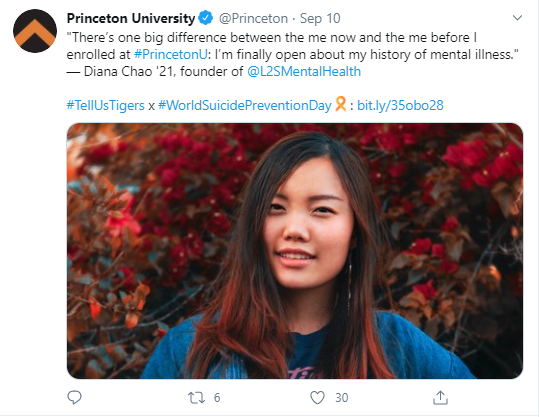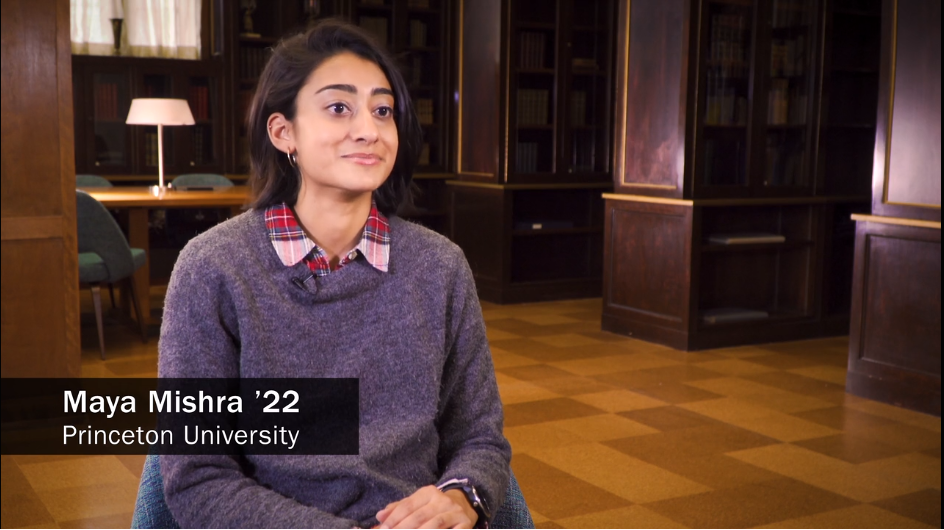From Study Finds: A new study out of Princeton University reveals the “silent phases” of viruses play a major role in how a pathogen evolves. Princeton researchers Chadi Saad-Roy, Bryan Grenfell and Simon Levin are quoted.
Category Archives: Uncategorized
Renters are still in eviction limbo
From Axios on HBO: Princeton’s Matthew Desmond discusses how the nationwide halt on most evictions is a Band-Aid for millions of renters who are at risk of losing their homes.
From Dracula’s castle to Zoom: Early modern philosophy conference finds new ‘remote’ community during pandemic

For the past 18 years, the Princeton-Bucharest Seminar in Early Modern Philosophy (PBS) — a vibrant collaboration between Princeton University and the University of Bucharest — has taken place in a remote Romanian village, nestled in the beautiful mountains of Transylvania. This summer, the participants engaged over Zoom and created a new “remote community.” https://www.princeton.edu/news/2020/09/16/draculas-castle-zoom-early-modern-philosophy-conference-finds-new-remote-community
This Is Not How I Pictured My Senior Year of College. But It’s Not All Bad Either
From Time: Princeton undergraduate Jimin Kang writes: It’s sad not to be on campus, and I understand the challenges of remote learning for so many. But as much as I miss the serendipitous run-ins with friends, the meals in the dining halls and the quiet library nights, I’ve come to realize that this break from the campus-based experience might hold value too.
Kicking off virtual fall teaching — with a little help from McGraw

Like schools across the country, Princeton’s undergraduate education is fully remote this fall due to the ongoing COVID-19 pandemic. In this story, faculty in the sciences, arts, humanities and social sciences talk about how they adapted and innovated their classes for virtual teaching, from science labs and dance classes to introductory lectures and small seminars. https://www.princeton.edu/news/2020/09/14/kicking-virtual-fall-teaching-little-help-mcgraw
Princeton University Launches Community Engagement Initiative
From Patch: Titled ‘A Year of Forward Thinking’ the initiative will involve students, faculty, staff, alumni and community members who will focus on issues like COVID-19, systemic racism, social justice and democracy, data science and bioengineering. https://patch.com/new-jersey/princeton/princeton-university-launches-community-engagement-initiative
University statement on U.S. Department of Education letter regarding nondiscrimination practices
On September 16, 2020, the University received a letter from the U.S. Department of Education requesting information about Princeton’s nondiscrimination practices.
The letter was the Department’s reaction to President Eisgruber’s update to the University community outlining the steps we are taking to address systemic racism at Princeton and beyond. Princeton has long been committed to creating and maintaining a community where all can thrive, and stands by its representations to the Department and the public that it complies with all laws and regulations governing equal opportunity, non-discrimination and harassment. This work is core to the University’s teaching and research mission, and we are vigilant in our pursuit of equity in every aspect of our programs and operations. The University also stands by our statements about the prevalence of systemic racism and our commitment to reckon with its continued effects, including the racial injustice and race-based inequities that persist throughout American society. Attracting talent from every sector of society is crucial to our academic mission, and we will continue to lead on these issues.
The University will respond to the Department of Education’s letter in due course. It is unfortunate that the Department appears to believe that grappling honestly with the nation’s history and the current effects of systemic racism runs afoul of existing law. The University disagrees and looks forward to furthering our educational mission by explaining why our statements and actions are consistent not only with the law, but also with the highest ideals and aspirations of this country. https://www.princeton.edu/news/2020/09/17/university-statement-us-department-education-letter-regarding-nondiscrimination
Coverage in the media:
- The New York Times: Princeton Admitted Past Racism. Now It Is Under Investigation.
- The Washington Post: Education Department launches investigation after Princeton’s president confronts ‘systemic racism’ on campus
- The Wall Street Journal: Princeton Faces Federal Probe After Acknowledging Past Racism
Alumni Kwanza Jones and José E. Feliciano make Princeton history with major gift

Kwanza Jones and José E. Feliciano have made a major gift to Princeton University, a $20 million contribution that is the largest gift to date by Black and Latino donors, and one of a few extraordinary alumni commitments to the University’s strategic goal of undergraduate expansion, with the construction of two adjoining dormitories in one of the two new residential colleges being built at Princeton. In recognition of their philanthropy and leadership, the University will name two buildings in their honor. One of the dormitories will be named for Jones, a member of the Class of 1993, and the other will be named for her husband, Feliciano, a member of the Class of 1994. https://www.princeton.edu/news/2020/09/17/alumni-kwanza-jones-and-jose-e-feliciano-make-princeton-history-major-gift
Coverage in the media:
WSJ PRO: Clearlake Co-Founder Gives $20 Million to Princeton University
A Year of Forward Thinking
“In the Nation’s Service and the Service of Humanity.” The University’s revised informal motto, etched in the stone medallion in front of Nassau Hall, was unveiled in October 2016. While the University has continued to evolve since then, our new engagement campaign, “A Year of Forward Thinking,” is grounded in that motto.
Spanning the 2020-21 academic year, the campaign will feature the voices of the University’s “forward thinkers” — students, faculty, staff, alumni and friends — who are pioneering solutions to key issues. Topics will include COVID-19; systemic racism; access, affordability, and inclusivity in higher education; environmental studies; social justice and democracy; data science and bioengineering.
Princetonians and others are invited to join in a conversation focused on responding to the challenges facing the nation and the world. As Provost Deborah Prentice put it, “We are not going to hunker down — we’re meeting the moment with creativity and resolve.”
More information about the campaign, and upcoming online events featuring an array of faculty voices from a variety of disciplines, is available at forwardthinking.princeton.edu.
Stay safe and healthy.
Michael Hotchkiss, Ayana Gibbs, Jess Fasano, and Ben Chang

Honoring the late mathematician John Horton Conway
A memorial/visitation honoring Conway will be held Sunday, Oct. 11, from 3-5 p.m., at Mather-Hodge Funeral Home, 40 Vandeventer Ave., Princeton, NJ 08542. The visitation will be from 3-4 p.m.; friends will be invited to speak from 4-5 p.m. Social distancing regulations limit the number of people inside at one time to 25. Please wear a face covering. Questions may be directed to dianaconway13@aol.com. https://www.princeton.edu/news/2020/04/14/mathematician-john-horton-conway-magical-genius-known-inventing-game-life-dies-age
Politics & Polls #200: Ask Us Anything
Politics & Polls: In honor of the 200th episode of Politics & Polls, Princeton’s Julian Zelizer and Sam Wang reflect on the show’s history with the show’s producer, B. Rose Huber. https://spia.princeton.edu/news/politics-polls-200-ask-us-anything
Mathematician Logunov wins New Horizons Prize

The Breakthrough Prize Foundation announced today that mathematician Aleksandr Logunov is one of 12 recipients of their New Horizons Prizes for early-career scientists and mathematicians who have already made a substantial impact on their fields. He wins “for novel techniques to study solutions to elliptic equations and their application to long-standing problems in nodal geometry.” https://www.princeton.edu/news/2020/09/10/mathematician-logunov-wins-new-horizons-prize
Princeton Profiles: Maya Mishra, aiming to serve in space

Junior Maya Mishra is pursuing a career in aerospace medicine. In this video, filmed prior to the COVID-19 pandemic, she discusses how she is following her passions for medicine, space and service at Princeton. https://www.princeton.edu/news/2020/09/10/princeton-profiles-maya-mishra-aiming-serve-space
Peter Singer:How (Not) to Fight COVID-19 (Project Syndicate)
Ramanan Laxminarayan:India’s coronavirus crisis is catching up to the U.S. – it may already be worse (CBS News)
Xiyue Wang, graduate student:Lessons From Three Years in an Iranian Prison (Foreign Affairs)
Omar Wasow: 100 days after Tampa Bay protests started, participants find other ways to be heard (Tampa Bay Times)
Keeanga-Yamahtta Taylor: The Players’ Revolt Against Racism, Inequality, and Police Terror (The New Yorker)
Imani Perry:White House memo calls for ban on federal agency training that suggests U.S. is racist (USA Today)
Aly Kassam-Remtulla: Sinophobia, the new Islamophobia (Al Jazeera)
Julian Zelizer:Trump has an uncanny ability to control the narrative. Here’s the message Democrats need to hammer home (CNN)and A Historical Look At Presidents’ Relationships With The Military (WBUR)
Grigore Pop-Eleches:Putin’s support is weakening. Will that show up in Russia’s regional elections this weekend? (The Washington Post)
Paul Frymer:Why 2020 may be a signal year for the American labor movement (Salon)
Pico Iyer, visiting lecturer in the Humanities Council:The Best Reason to Go to College (The New York Times)
Forrest Meggers and Eric Teitelbaum: Cooling off without air-conditioning (The Washington Post)
Jamie Rankin: The weird space that lies outside our Solar System (BBC Future)
Tim Searchinger: Hamburgers are hard on the planet. These cattle ranchers are trying to change that (CNN)
Stephen Kotkin:Holistic and lasting sustainability (Top1000funds.com)
How Eviction Lab is helping journalists cover a spiraling housing crisis
From Nieman Lab: It is not the best of times. The pandemic and a patchwork of emergency orders have made the numbers and laws around eviction even harder to keep straight. That’s where Eviction Lab, part of Princeton University, hopes to help.
The Eviction Lab maintains a national eviction database and makes the 83 million eviction records they’ve collected available for analysis or merging with other data sources. Their maps and reports are free for publications to customize and embed. As Covid-19 has worsened the housing crisis, researchers have also started live tracking evictions in 17 cities and explaining what various moratoriums, guidelines, and orders actually mean for the nation’s renters. https://www.niemanlab.org/2020/09/how-eviction-lab-is-helping-journalists-cover-a-spiraling-housing-crisis/
Coronavirus disinformation adds conspiratorial fuel to a volatile Middle East
From Bulletin of Atomic Scientists: Written by Princeton’s Research Specialist Samikshya Siwakoti, Professor Jacob N. Shapiro, rising junior Isra Thange, and Research Assistant Alaa Ghoneim. https://thebulletin.org/2020/09/coronavirus-disinformation-adds-conspiratorial-fuel-to-a-volatile-middle-east/
Researchers Control Bacteria by Switching Lights On and Off
From The Science Times: A team of scientists from Princeton University has demonstrated a way to precisely control the response of genetically engineered bacteria by switching lights on and off, controlling the bacteria’s chemical production. https://www.sciencetimes.com/articles/27230/20200909/researchers-control-bacteria-switching-lights.htm
3.1 magnitude earthquake reported in Monmouth County, N.J.
From 6 ABC: Researchers at Princeton studied data collected from campus, 30 miles from the epicenter. Princeton’s Frederik Simons estimated this earthquake could be felt within a radius of 30-50 miles from Freehold. https://6abc.com/31-magnitude-earthquake-hits-freehold-new-jersey/6415086/
